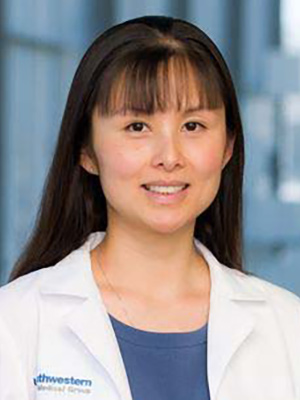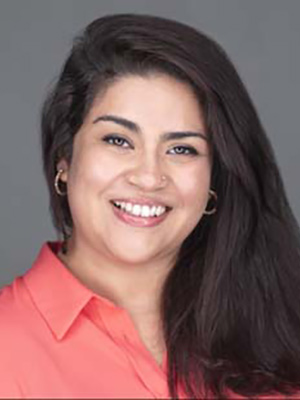
Nina Sanford, radiation oncologist at UT Southwestern Medical
Center in Dallas. Photo courtesy of Nina Sanford
How can I be sure my health care provider
knows about and respects the customs and traditions important to me
because of my cultural background?
NINA SANFORD: As much as cancer treatment is evidence-based, there are different options to consider and choices to make, including whether to go with treatment at all. Oftentimes your values and preferences are related to cultural perceptions of disease and what’s important in life. I recently examined survey data showing that cancer survivors who belong to a non-white minority group are more likely than white cancer survivors to report that it’s important that their physicians share or understand their culture. They also more often reported that they were unable to see a physician who understood or shared their culture. Minority cancer patients and survivors tend to place greater emphasis on cultural competence in their care team.
Of course, it’s natural for people to form a bond more easily with people who have a similar background. Because there are fewer non-white cancer doctors—far fewer than non-white patients, proportionally—minority patients are not going to have that connection as often. This is not to say that every patient should seek out a doctor who is the same race and ethnicity as they are, but it is reasonable to expect and ask for a certain level of cultural awareness and respect from your care team.
One thing to consider is the importance of language and communication. If English is not your first language, you should advocate for your right to have an interpreter who speaks your language. I sometimes have patients who speak a little bit of English, or perhaps have a young relative who can help translate. But you really need to advocate for your right to a professional interpreter at clinic visits. Not being able to fully convey your thoughts and concerns to your provider is a significant barrier.
Another thing I’d recommend is to come to the clinic with a list of questions and concerns. This is really important, especially if you have bigger questions related to cultural beliefs or issues, such as therapy versus no therapy. I’m always happy when a patient comes with a list of questions. You may get more out of your visit this way, since consults can tend to feel overwhelming.
Finally, don’t be afraid to get a second opinion. You want to feel a sense of comfort and trust in your provider. Don’t hesitate to switch providers if it’s not a good match. In some cultures, there’s a hierarchical relationship between doctors and their patients. Patients are expected to follow doctor’s orders. That’s not how I see it. It’s about teamwork, and I always encourage patients to get another opinion if they are having doubts about their care. Finding the right fit can be especially important for patients who potentially come from different cultural backgrounds than their doctor.
CULTURALLY COMPETENT CANCER CARE //American Family Physician
explains the appropriate use of medical interpreters. // The
American Cancer Society
offers reasons to consider getting a second opinion.
As a cancer survivor, the pandemic is making me feel anxious and on
edge all the time. How can I address this?

Jessica Yasmine Islam, cancer epidemiologist and researcher at the H. Lee Moffitt Cancer Center & Research Institute in Tampa, Florida. Photo courtesy of Jessica Yasmine Islam
JESSICA YASMINE ISLAM: The first thing you should know is that you are not alone. My colleagues and I recently conducted a study looking at this very issue. We evaluated mental health-related symptoms among cancer survivors compared to adults without cancer during the COVID-19 pandemic. Our findings show that cancer survivors are more likely to report feeling nervous, anxious or on edge compared to the general population.
Self-reported symptoms of anxiety, depression, loneliness and hopelessness were also elevated among cancer survivors. This was true even among cancer survivors without any history of having been diagnosed with a mental health condition. If you are a caregiver and have concerns about the mental health of someone you are caring for, it may help to be aware of the potential physical symptoms of mental health concerns, such as trouble breathing, sweating, feelings of restlessness and insomnia.
For people who have had cancer, social distancing, isolation and limited interactions with regular social networks may be even more difficult to endure than they are for other people. Your continuity of care may also have been disrupted by the pandemic. As a result, opportunities for you to share your concerns and find support may be more limited now than they would be at other times.
Many providers are offering telehealth appointments or phone-based appointments for those with limited access to the internet. It’s a good idea to talk about your feelings and fears with family members and close social networks. You can seek support through support groups and counseling or lean on your personal faith or other types of spiritual support. Meditation, deep breathing and relaxation are also key strategies for alleviating feelings of frustration, anxiety or hopelessness.
All this being said, I suggest seeking professional help from counselors
or physicians, who may be able to suggest treatments or other behavioral
interventions, if necessary. Certainly, if you’ve lost interest in daily
activities or are experiencing thoughts of suicide, it’s important to seek
help right away. If you are struggling, let someone know. Help is out
there and you’re not alone.
CANCER AND COVID-19 //
Cancer.net
offers tips on finding mental health support during cancer.
// The
Centers for Disease Control and Prevention
has advice on healthy ways to cope with stress during the COVID-19
pandemic.

Marlee Kiel, social worker at CancerCare in New York
City. Photo courtesy of Marlee Kiel
MARLEE KIEL: It’s never too early to start the conversation about end-of-life preferences and plans. The earlier you bring this up, the better, generally speaking. Keep in mind that this will be an ongoing conversation. It will take time to discuss and process the emotions that come up for you and the loved one you’re caring for.
You certainly want to bring up end-of-life plans while your loved one is still aware and fully able to have that conversation, as opposed to waiting until they are no longer capable of making decisions about what they want. As soon as they learn that a cancer might not be curable, I always encourage people to start talking about end-of-life plans.
Having this conversation early can help your loved one maintain a sense of control and autonomy in a situation in which they may not have a lot of control over their own body. In this sense, talking about end-of-life wishes isn’t about giving up on treatment. It’s about helping your loved one maintain control. These conversations are difficult for everyone, but reframing them this way can be helpful.
Another thing I’d recommend is that you reach out to a social worker on
your medical or hospice team. There are lots of resources out there that
can help you work through do not resuscitate (DNR) orders, what the
funeral will look like, estate planning and all the other elements of the
end of life. Find people or tools to outline the necessary steps so you
can complete these tasks in a more organized and less overwhelming way.
END-OF-LIFE PLANNING // Familydoctor.org explains advance directives and do not resuscitate orders. // UCLA Health outlines the difference between palliative care and hospice.
Cancer Today magazine is free to cancer patients, survivors and caregivers who live in the U.S. Subscribe here to receive four issues per year.




